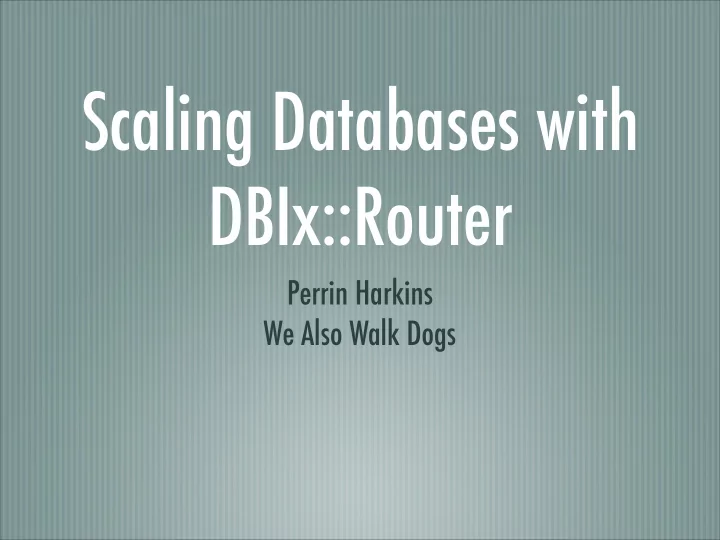

Scaling Databases with DBIx::Router Perrin Harkins We Also Walk Dogs
What is DBIx::Router? Load-balancing Failover Sharding Transparent (Mostly.)
Why would you need this? Web and app servers are easy to scale Just add another dozen boxes
Why would you need this? Databases not so much Big iron Commercial clustering solutions Human sacrifice
Advice from Experts Jeremy Zawodny Brad Fitzpatrick, Cal Henderson, and Derek J Balling, “Inside LiveJournal’s Backend” “Building Scalable Websites” “High Performance MySQL”
Caching Keep your hot data in a fast cache You get this one for free, thanks to DBI::Gofer Can use Cache::FastMmap, memcached, etc. through CHI
Read-only Copies Replication to local server or remote slaves Be careful of replication lag (from MySQL 5.1 docs)
Sharding Large data is split across multiple machines Users A-L, M-Z Logs by month Consistent hashing algorithm May involve directory server JOINs are now the programmer’s problem
This is going to mean a custom database layer And rewriting all your old code to use it DBIx::Router tries to separate this plumbing
Shoulders of Giants Enter DBI::Gofer “A scalable stateless proxy architecture for DBI” Bundles up requests, sends them over a transport, executes them, sends back results
Shoulders of Giants Used by shopzilla.com and petfinder.com to pool connections Lots of good stuff like caching, timeouts, tracing DBIx::Router is a Gofer transport But it executes the calls locally
Shoulders of Giants CPAN makes everything easy SQL::Statement parses SQL (!) Config::Any solves the XML problem
How does it work? DataSources Individual (DSNs) or Group Group handles failover Also load-balancing
Single DataSource { name => 'Master1', dsn => 'dbi:Pg:dbname=lolcats', user => ‘icanhas’, password => ‘ch33zeburger’, },
Group DataSource { name => 'ReadCluster', class => 'random', datasources => [ ‘Slave1’, ‘Slave2’ ], },
Group DataSource { name => 'ReadCluster', class => 'roundrobin', datasources => [ ‘Slave1’, ‘Slave2’ ], },
Group DataSource { name => 'ReadCluster', class => 'roundrobin', datasources => [ ‘Slave1’, ‘Slave2’ ], failover => 1, timeout => 8, },
Group DataSource { name => 'ReadWriteCluster', class => 'repeater', datasources => [ ‘Master1’, ‘Master2’ ], },
Group DataSource { name => 'StoreShards', class => 'shard', type => 'list', table => 'orders', column => 'store_id', shards => [ { values => [ 1, 3, 5 ], datasource => 'EastCoast', }, { values => [ 2, 4, 6 ], datasource => 'WestCoast', }, ], },
Subclass DataSources Custom auth schemes for the paranoid Ye olde insane load-balancing scheme Shards with a directory server
Rules Map queries to DataSources Organized in RuleLists Most specific to least Can fall back to pass-through
Rule: regex { class => 'regex', datasource => 'ReadCluster', match => ['^ \s* SELECT \b '], not_match => ['\b FOR \s+ UPDATE \b '], },
Rule: readonly { class => 'readonly', datasource => 'ReadCluster', },
Rule: parser { class => 'parser', match => [ { structure => 'tables', operator => 'all', tokens => ['order_history’] }, }, Operators: all, any, none, only Structures: command, tables, columns
Rule: not { class => 'not', rule => { class => ‘readonly’ } datasource => 'Master1', },
Rule: default { class => 'default', datasource => 'Master1', },
{ datasources => [ { name => 'Master1', dsn => 'dbi:mysql:dbname=lolcats', user => undef, password => undef, }, { name => 'Slave1', dsn => 'dbi:mysql:dbname=zomg1', user => undef, password => undef, }, { name => 'Slave2', dsn => 'dbi:mysql:dbname=zomg2', user => undef, password => undef, }, { name => 'ReadCluster', class => 'random', datasources => [ 'Slave1', 'Slave2', ], failover => 1, timeout => 8, }, ], rules => [ { class => 'readonly', datasource => 'ReadCluster', }, { class => 'default', datasource => 'Master1', }, ], }
How do you run it? DBI_AUTOPROXY=”dbi:Gofer: \ transport=DBIx::Router; \ conf=/path/to/conf.pl” $dbh = DBI->connect("dbi:Gofer: \ transport=DBIx::Router; \ conf=/path/to/conf.pl; \ dsn=$original_dsn", $user, $passwd, \%attributes);
What’s the bad news? AutoCommit But Tim plans to fix that No streaming results Also fixable Failover and sharding are tough to generalize
Status Hosted on Google Code Mostly there, but some bits need work Sharding Failover Needs user feedback Needs more tests
Future Directions Make routing decisions optionally sticky Support explicit hints in method call attributes Helps with sharding Workaround for tricky queries that fool SQL::Parser
Thanks! http://code.google.com/p/dbix-router/
What else is out there? Mostly faux DBD drivers DBD::Multi DBD::Multiplex DBIx::HA DBI::Role
Recommend
More recommend